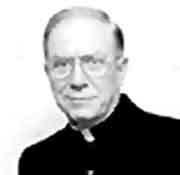 | Father Richard James Cleary was born and reared in Wichita. After graduation from Cathedral High School in 1947, he attended the seminary operated by the Benedictine monks of Conception Abbey in Northwestern Missouri. There he came to appreciate the life of the monks and, having obtained the permission of Bishop Mark Carroll of Wichita, he became a monk of that monastery. After being ordained a priest in 1955, his superiors sent him to get his master’s degree at the University of Ottawa, Canada, then to study in Athens, Greece, and then in Rome, Italy, where he obtained his doctor’s degree in Theology. Finally, he spent a year of study at Harvard University. Later, Fr. Cleary was assigned to teach for many years in Rome. In 1998, he returned to Wichita, where he served in parish ministry at St. Mary’s Cathedral and at Blessed Sacrament parishes. In 2001, his abbot (superior) transferred him to Arkansas, where he served as chaplain of the Benedictine Sisters of Holy Angels Convent in Jonesboro, and helped in the parishes of northeast Arkansas. In March 2010, he was re-assigned to his monastery, Conception Abbey, Conception, in Missouri 64433. He can be contacted there at, 660-944-2877, or by email: rjcleary@juno.com. |
Religion
2012-11-01 14:48:58
The fallen angels
A- Only from divine revelation can we know anything about God and his creatures before the creation of man. In the last book in the Bible, Revelation, (chapter 12, verses 7-9), St. John informs us that: “War broke out in heaven; Michael and his angels battled against the dragon. Although the dragon and his angels fought back, they were overpowered and lost their place in heaven. The huge dragon, the ancient serpent known as the devil or Satan, the seducer of the whole world, was driven out; he was hurled down to earth and his minions with him.” Revelation, as such, is outside the order of time. Therefore it seems appropriate that God reserved this information to the final book of the Bible: to explain the eternal conflict between the forces of good and evil, which is a major theme of the whole Bible.
Earlier, St. Peter had written in his second epistle, warning about false prophets: “In times past there were false prophets among God’s people, and among you also false teachers will appear. They will introduce pernicious untrue doctrines, and will deny the Master who redeemed them, and so they will bring upon themselves sudden disaster. Even so, many will follow their immoral ways. . . . Their condemnation has not lain idle all this time. . . . God did not spare the angels who sinned, but threw them into hell, where they are kept chained in darkness, waiting for the Day of Judgment” (2 Peter 2:2-4). The Apostle then goes on to describe some of the evils perpetrated by unprincipled men, and the appropriate punishments they have received or are awaiting them. That text certainly describes the fate of the fallen angels. Some Fathers of the Church e.g. Origen and St. Augustine) considered a sentence in the first chapter of the first book of the Bible, Genesis, as referring to this conflict between the angels (Gen 1:4): “God saw how good the light was. God then separated the light from the darkness.” Here the light represents the good angels, while the darkness refers to the bad angels.
St. Peter mentioned “the angels who sinned.” This fall consists in the free choice of those created spirits, who radically and irrevocably rejected God and his reign. The Church’s tradition holds that this rejection was the sin of pride. The angels are pure spirits, and each angelic spirit is specifically different from every other angel. This difference is as great as the difference of man from brute animal, and the brute animal is different from a plant, and a plant is different from a mineral. Mankind embraces each of these latter differences, being composed of spirit and matter. Possessing a nature superior to mankind, each angel is more brilliant and more intelligent that all of mankind. Before he created human beings, God confided to the angels his plan for the creation of mankind and this universe. He also indicated that, in the course of time, his own Son would take on human nature in the Incarnation. Some of the angels, led by Lucifer, felt insulted by this plan of God: that God would have his own Son become a man, assuming a nature lower than their own nature. And so they exercised their free will in rebellion against God, saying: “I will not serve (a man)!” Those angels sinned by this rejection of God’s plan and were cast out of heaven, becoming the devils. Their choice against God is definitive. They try to associate man in their revolt against God (cf Catholic Catechism, Para. 414). God permitted such painful upheavals as the angels’ fall and man’s sin: only as occasions and means for displaying his power and beauty, and the whole measure of the love he wanted to give the world (cf Catholic Catechism, Para. 760).


